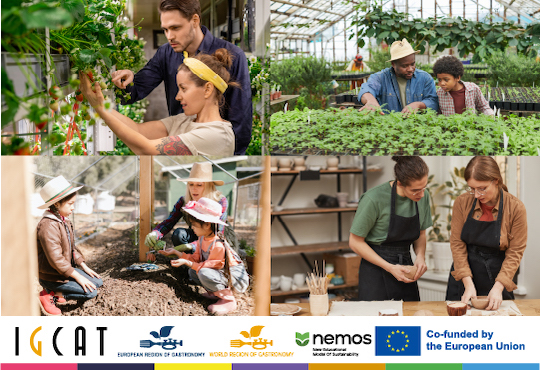IGCAT believes that enabling young people to contribute to different policy areas is an asset for sustainability and inclusive growth. In order to explore this topic, Engaging Young Minds will be the theme of the 9th Annual IGCAT Experts Meeting and first multiplier event of the NEMOS project that will be held online on 20 October 2022, 14:00h-16:00h CET.
The purpose of the meeting is to highlight good practices and pioneering projects involving young people in the awarded World/European Regions of Gastronomy. These will be combined with knowledge and experience from the Erasmus+ project NEMOS – A new educational model for acquisition of sustainability competences through service-learning, aiming at equipping students with the necessary skills to tackle the most pressing sustainability challenges once they access the labour market.
Cross-sectoral perspectives will be invited from experts as well as young people from the World/European Regions of Gastronomy and beyond, on how to engage and activate young talent in the quest to build a more sustainable future.
After an initial introduction, the webinar will concentrate on eight key group discussions led by IGCAT Experts on:
INTEGRATION OPPORTUNITIES IN WORLD REGIONS OF GASTRONOMY
Creativity in the kitchen is enriched by cultural stimuli and therefore can offer opportunities to people that otherwise could be marginalised. How do we marry the need to protect traditional food and provide opportunities for a fusion of cultures in the kitchen?
BUILDING PRIDE IN FOOD HERITAGE
Can we use consumer psychology to build children’s knowledge and pride in their food heritage? Can we learn techniques and tools to ensure our young embrace healthy and local eating habits?
INTEGRATING SUSTAINIBILITY COMPETENCES IN EDUCATION
How will food discipline graduates address challenges such as climate change and food waste and meeting environmental sustainability targets?
IMPROVING INNOVATION, VISIBILITY AND AVAILABILITY OF LOCAL FOOD GIFTS
How can we ensure that traditional crafts techniques are protected while encouraging contemporary design? Are we doing enough to ensure that young people have the opportunity to showcase and sell innovative food and crafted gifts?
BUILDING CRITERIA FOR FOOD SUSTAINABILITY
What more can our IGCAT Chef Ambassadors do to move the food sustainability agenda forward?
EMPOWERING YOUNG MINDS = NEW IDEAS!
Are competitions a good way to inspire sustainable thinking and how else can we provide young minds the opportunity to contribute to a more sustainable and healthy food future?
BEE POSITIVE
How can public and private initiatives encourage younger generations to safeguard bees and other pollinators that are so vital for our food chain?
FOOD FOR THE FUTURE
Are creative and artistic projects a better way to encourage young people to think about their food future?
Registration for the webinar on IGCAT’s website: Engaging Young Minds until 18 October 2022. Places are limited and available on a first come, first served basis.
During the webinar, IGCAT will also announce the winners of the IGCAT’s International Food Film Menu 2022 public vote.
About the European/World Regions of Gastronomy
Candidate and awarded European/World Regions of Gastronomy, guided by IGCAT, are working together to strengthen food security through the celebration of distinctive food cultures; create employment by stimulating creativity and gastronomic innovation; nourish children and adults through culinary and cultural education; drive environmental sustainability in tourism, hospitality and agricultural sectors; support balance and sustainable tourism practices; highlight and support expertise from within rural and urban communities, creating connections and sharing good practises; and contribute to community health and well-being.
About IGCAT
IGCAT aims to empower local communities by raising awareness of the importance to protect and promote distinct regional food, culture, arts and natural assets as part of sustainable and balanced tourism and development strategies. This is essential to safeguard our planet, health, wellness and local economies.
IGCAT is a non-profit institute established in 2012, working with regional stakeholder consortiums in the fields of gastronomy, culture, arts and tourism. It counts on the expertise of a worldwide network of experts and works in partnership with specialised intergovernmental organisations.
IGCAT founded the European and World Region of Gastronomy Award and is the official secretariat for the World and European Regions of Gastronomy Platforms. Furthermore, the Institute has developed the European Young Chef Award, the World Food Gift Challenge, the Top Websites for Foodie Travelers Award and the Food Film Menu.
About the NEMOS project
The NEMOS project acknowledges sustainability as an increasingly crucial skill for graduate and post-graduate students to tackle important global challenges such as climate change, food waste and the loss of biodiversity in their professional future. Therefore, the project aims to define a new educational model to integrate sustainability competences in the curricula of food-related degrees by means of service learning.
Co-funded by the Erasmus+ programme of the European Union, the NEMOS project is led by the Public University of Navarra and includes the following consortium partners: Technological University Dublin (Ireland); Technological University Graz (Austria); Rhône-Alpes Higher Institute of Agriculture (France); University of Pisa (Italy); and IGCAT.

